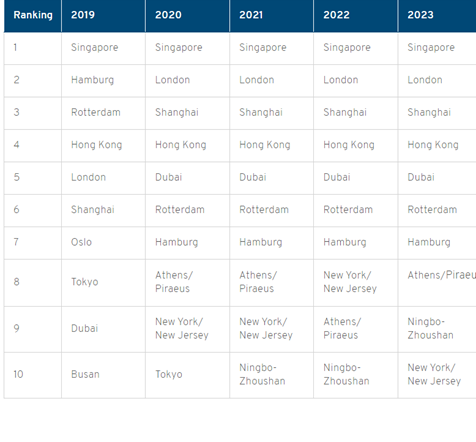For the 10th year in a row, Singapore ranks first in the Xinhua-Baltic International Shipping Centre Development Index (ISCDI) Report.
Published jointly by Chinese state news agency, Xinhua, and global maritime data provider, Baltic Exchange, the report lists Singapore as the global leading maritime centre, followed by London and Shanghai.
The island nation scored 95.32 out of a possible 100 points, while the maritime support services powerhouse of London scored 83.35 points and the mighty port-city of Shanghai takes third place with 81.58 points.
Singapore has held the top position since the Index began a decade ago. It has retained its position due to its winning combination of strategic location, international outlook and established ecosystem of professional global maritime services and good governance.
London and Shanghai have retained their positions of second and third place within the Index for the past four years.
Further down the top 10, there was little movement as Hong Kong, Dubai, Rotterdam and Hamburg take fourth, fifth, sixth and seventh place, respectively.
The trading capital of New York and its New Jersey port dropped by two places from eighth place last year, to 10th place this year while Athens/Piraeus moved up by one place. A relative newcomer to the Index, Ningbo-Zhoushan, sits at number nine. The Chinese city’s ranking amongst the top 10 is primarily due to it being the busiest port in the world in terms of cargo tonnage.
The main findings of the index were as follows:
· Singapore leads the rankings for the 10th consecutive year followed by London, Shanghai, Hong Kong and Dubai
· Ease of doing business, access to professional maritime services and location remain key ingredients for a leading maritime business hub
· The top 10 locations remain largely unchanged since 2022 and features four Asian, four European, one Middle East and one United States location
A total of 43 maritime locations were rated as part of this report, which considers port factors including cargo throughput, number of cranes, length of container berths and port draught; number of players in professional maritime support businesses such as shipbroking, ship management, ship financing, insurance and law, as well as hull underwriting premiums; and general business environment factors such as customs tariffs, extent of electronic government services and logistics performance.
The average score amongst the top 10 ports is 77.21 out of 100, with the average across the entire 43 rankings standing at 59.19.
Baltic Exchange chief executive officer Mark Jackson said: “It’s been a decade since the Baltic Exchange started working with Xinhua News Agency on this Index and during that time we have witnessed a growing amount of trade move from west to east. This shift in trade flows is clearly visible looking at the Xinhua-Baltic ISCDI top 10 rankings over the past decade. This report is a valuable reminder of how intrinsic the maritime industry is to global trade.”
Xu Yuchang of China economic information service, a subsidiary of Xinhua, said: “The report underscores the significance of maritime within world trade, and showcases the depth and breadth of this unique industry. In this 10th report we also spotlight the importance of emission reduction strategies and technologies that will be essential for the long-term sustainable future of the industry.”
Chief Executive of the maritime and port authority of Singapore, Mr Teo Eng Dih, said: “We remain committed to fostering an environment that encourages enterprise, innovation, and talent development. We will continue our work with our partners to enhance Singapore’s connectivity, advance digitalisation efforts, and accelerate the decarbonisation of international shipping.”




